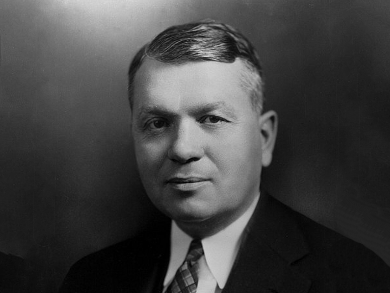Harold Clayton Urey was born on April 29, 1893, in Walkerton, IN, USA. He studied at Montana State University, Bozeman, USA, where he received a Bachelor’s degree in zoology in 1917. He worked as a chemical engineer during the first World War and received his Ph.D. in physical and mathematical chemistry from the University of California, Berkeley, USA, in 1923.
After his doctorate, Urey worked under Niels Bohr at the University of Copenhagen, Denmark, for a year and then joined Johns Hopkins University, Baltimore, MD, USA. He was appointed Associate Professor of Chemistry at Columbia University, New York, USA, in 1929. He discovered deuterium there, working with Ferdinand Brickwedde and George Murphy. The team isolated the isotope by fractional distillation of liquid hydrogen. For this discovery, Urey received the Nobel Prize in Chemistry in 1934.
During World War II, Urey worked on the separation of fissionable 235U from 238U for the atom bomb as part of the Manhattan project. He advised against using the bomb in Japan and later supported an international ban of nuclear weapons. After the war, he joined the University of Chicago, IL, USA. There, he developed the famous Miller-Urey experiment together with his graduate student Stanley Miller to find clues on the chemical origin of life. The experiment simulates conditions on the early Earth by passing electric sparks through a mixture of methane, ammonia, hydrogen, and water. Building blocks of living organisms, such as amino acids, were found among the reaction products.
Urey joined the University of California, USA, in 1958, where he remained until his retirement in 1970. He was not only interested in physical chemistry, but also in lunar science and the study of meteorites and he supported the space program. Harold Urey died on January 5, 1981, in La Jolla, CA, USA. The asteroid (4716) Urey and the lunar impact crater Urey are named in his honor.
Harold Urey is the answer to Guess the Chemist (76).
Sources
- Harold C. Urey – Biographical,
Nobel Lectures, Chemistry 1922-1941,
Elsevier Publishing Company, Amsterdam, 1966. - Harold Urey, Scientist, Dies at 87; War Foe’s Work Led to H-Bomb,
Malcolm W. Browne,
The New York Times, January 7, 1981.
Selected Publications
- A Hydrogen Isotope of Mass 2,
Harold C. Urey, F. G. Brickwedde, G. M. Murphy,
Phys. Rev. 1932, 39, 164–165.
https://doi.org/10.1103/PhysRev.39.164 - Organic Compound Synthesis on the Primitive Eart: Several questions about the origin of life have been answered, but much remains to be studied,
S. L. Miller, H. C. Urey,
Science 1959, 130, 245–251.
https://doi.org/10.1126/science.130.3370.245 - Lifelike Forms in Meteorites: Are fossils present in carbonaceous meteorites? The evidence is suggestive but as yet inconclusive,
H. C. Urey,
Science 1962, 137, 623–628.
https://doi.org/10.1126/science.137.3530.623 - Life-Forms in Meteorites: Origin of Life-like Forms in Carbonaceous Chondrites Introduction,
H. C. Urey,
Nature 1962, 193, 1119–1123.
https://doi.org/10.1038/1931119a0 - Biological Material in Meteorites: A Review,
H. C. Urey,
Science 1966, 151, 157–166.
https://doi.org/10.1126/science.151.3707.157




